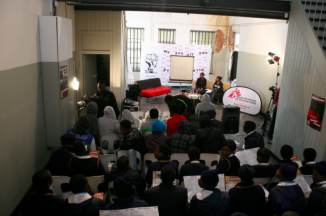It aims to promote critical analysis of contemporary social, political and economic issues of the city, the country and the continent. K!ASP has gone through ‘phases’ of development, each phase a scaffold of the previous, as well as a conversation with practices from the outer world. Here we advise the jury to consult the Revista MESA ‘Publicness in Art’ link for a deeper, sensorial understanding of K!ASP through the auto-case study.
Keleketla! Library’s move out of the historical liberation struggle of Drill Hall in 2015 to an industrial zone on the edge of a gentrifying neighbourhood, led to a sabbatical for K!ASP, except for periodical engagements with our partner institutions such as Freedom Community College and Wits School of Arts. This moment of reflection offered us full participation in the international research group, Another Roadmap for Arts Education, and our contribution to a festival on indigenous music in rural Ga-Molepo, South Africa.
Keleketla!’s dream project is to revise K!ASP by way of reenacting the 1982 Culture & Resistance Symposium and Festival held in Gaborone, Botswana. 2018, the year Keleketla! turns 10, would be a fitting moment to rethink K!ASP’s continued contribution to imagining a ‘free, quality and decolonised education’ called for by the student movement, #FeesMustFall. We are seeking progressive strategies to reclaim the Drill Hall as one of the most deserving sites for experimental, free engagement with art in relation to history, education and politics. Its dense population of commuters and residents, coupled with its city-defined ‘complexity’ makes it urgent.

